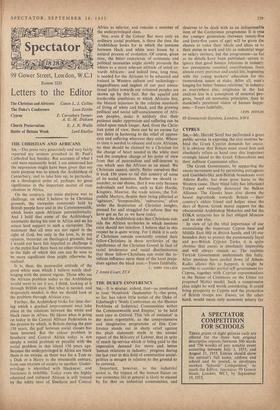Letters to the Editor
The Christian and Africans Canon L. J. Collins The Duke's Conference Leon Zeitlin Cyprus F. Carruthers Turner
A. G. M. Dickson
Church Preservation E. J. N. Wallis Battle of Britain Week Lord Knollys
THE CHRISTIAN AND AFRICANS
SIR,—The press very generously and very fairly reported my sermon preached in SL Paul's Cathedral last Sunday. But accounts of what I said were necessarily brief. 1 am concerned lest the impression might have been given that my main purpose was to attack the Archbishop of Canterbury, and to take him up, in particular, on a theological point of, perhaps, no great significance in the important matter of race relations in Africa.
On the contrary, my main purpose was to challenge, on what I believe to be Christian grounds, the viewpoint commonly held by British people here and in the Commonwealth, which looks upon Africans paternalistically. And I hold that some of the Archbishop's statements during his tour in Africa and en his return lend support to such a viewpoint. The statement that all men are not equal in the sight of God, but only in the love, is, in my opinion, incorrect on theOlogical grounds; but I would not have felt impelled to challenge it in the pulpit had there been no other statements in the light of which this one can be seen to be more significant than might otherwise be realised.
It is, then, the paternalist attitude of the good white man which I believe needs chal- lenging with the utmost vigour. Those who see the African problem today as the Archbishop would seem to see it are, I think, looking at it through British eyes. But what is needed, and desperately needed, is that we should look at the problem through African eyes.
Further, the Archbishop looks for time dur- ing which a gradual improvement may take place in the relations between the white and black races in Africa. He likens what is going on today in the Central African Federation to the process by which, in Britain during the past 150 years, the gulf between social classes has been lessened. But the colour problem in Southern and Central Africa today is not simply a social problem or parallel with the social problem in this island 150 years ago. Because the underprivileged in Africa are black there is no escape, as there was for a Tom or a Dick or a Harry in the nineteenth century, from one stratum of society to another. Under- privilege is identified with blackness : and blackness is indelible. Today even the highly educated and cultured African is still treated by the white man of Southern and Central Africa as inferior, and remains a member of the underprivileged class.
Nor, even if the Colour Bar were only an ordinary social problem, is there the time the
Archbishop looks for in which the tensions between black and white may lessen by a natural process of evolution. Of course, given
time, the bitter experience of economic and
political necessities might slowly persuade the whites to a more tolerant attitude of mind to- wards Africans: and indeed time, long time,
is needed for the Africans to be educated and trained in Western culture and technology—
niggardliness and neglect of our past educa- tional policy towards our coloured peoples arc shown up by this fact. But the squalid and intolerable conditions in which Africans live, the blatant injustices in the relative standards of living of white and black, and the growing political and social self-consciousness of Afri- can peoples, make it unlikely that their patience under oppression and suffering can be
relied upon much longer. And, from the Chris- tian point of view, there can be no excuse for any delay in hastening to the relief of oppres- sion and suffering wherever they exist. Where- as time is needed to educate and train Africans, no time should be claimed by a Christian for the change of heart needed in the white man and the complete change of his point of view from that of paternalism and self-interest to one which sees the African as an equal. We Christians cannot, surely, flatter ourselves that it took 150 years to rid this country of some of its social injustices. Rather we should re- member, to our shame, that it was only because individuals and bodies, such as Keir Hardie. Kingsley, Maurice, the trade unions, the Tol- puddle Martyrs, despite their being pilloried as
'agitators,' 'irresponsible; often under the inspiration of Christian insights, pressed for and struggled for reform that we have got as far as we have today.
And the Archbishop asks that Christians out- side the African territories in which tensions exist should not interfere. I believe that in this respect he is quite wrong. For I think it is only if Christians outside constantly remind their fellow-Christians in those territories of the significance of the Christian Gospel in face of racial intolerance and racial discrimination that those fellow-Christians can resist the in- sidious influence upon them of the local preju- dices against the black man.—Yours faithfully, 2 Amen Court, EC4
L. JOHN COLLINS'


































 Previous page
Previous page